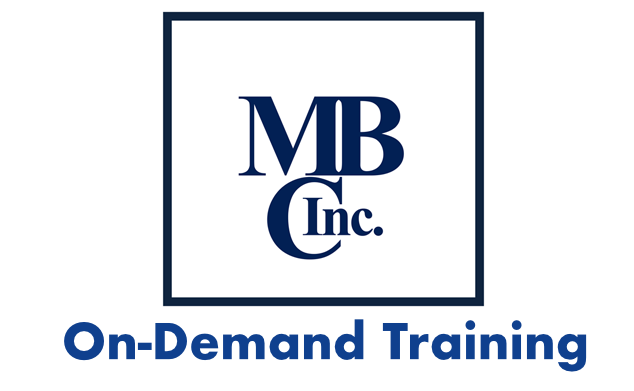MBC, Inc. Newsletter Topics on “Leadership”
As Inspired by “The Leadership Secrets of Colin Powell”
By – *Oren Harari
How do Leaders Develop Trust and Respect?
In General, Powell’s Terms “Trust those that do the work”
“Wisdom resides in the trenches, unless proven otherwise”. Gen. Colin Powell
Our last edition on organizational culture and leadership was a discussion about the selection of the best people. The preceding fact gives a direct lead-in to this week’s discussion about “trust”. If I seek and select the best people, does it not seem natural that I would exercise trust and respect for each one selected? This only seems appropriate and natural.
When you look at decentralization at a macro level, our economic structure in the United States represents decentralization. Private business working with the customer in mind is in the best position to make customer related decisions. That is exactly why central control of economies does not work as well and cannot compete with an economic model such as ours. It is this same concept but on a more micro level that we are talking about from a business or organizational level. Leaders generally love to “give-direction”, “issue-orders”, “make-all-the-decisions” or just generally control everything. When you break down this centralized approach it becomes very obvious that certain decisions are best made from a position closer to the work or closer to the customer than Top Management.
organizational level. Leaders generally love to “give-direction”, “issue-orders”, “make-all-the-decisions” or just generally control everything. When you break down this centralized approach it becomes very obvious that certain decisions are best made from a position closer to the work or closer to the customer than Top Management.
The issue becomes how I accomplish decentralization while maintaining organizational goals, objectives and methods. Here I will use the terminology “a tightly organized and loose organization”. This is not, conflicting structures nor is it an oxymoron. It is a description of an effective approach to allowing people at all levels of an organization to exercise freedom and at the same time work within defined parameters. Obviously, this is a balancing act by middle and top level leaders. Balance is what makes this effective, risky and beneficial. If you have been following this entire series on leadership you have noticed by now that one of the great task for leaders is “how-do-I-balance” all these attributes.
A tightly organized and loose organization, definition is not very difficult to understand. It means leaders must define the parameters, within which subordinates are allowed to work. Additionally the middle and top-level leaders MUST define goals, objectives, requirements, work rules, etc. All this must be in writing, communicated to the organization and understood by all subordinates. How subordinates accomplish the requirements gives them a great deal of liberty to exercise their own judgment as they develop methods to meet the defined objectives.
Decision making at the appropriate level can be confusing to some. Where coordination is needed decisions must be made at least one level of leadership above the coordination point.
Such as the following scenarios, demonstrate:
- A manufacturing facility must have a defined starting time for all employees that have production responsibility that is directly associated with a production line. When this is true, there must be a “directive” from a higher level of leadership as to what the start time is for all production workers.
- A software company that employees multiple programmers would not have to have such a structured start time for programmers. In this scenario, programmers working on the same project do not actually have to coordinate with other programmers on a real time basis daily. In this later application, the programmers could control the start times individually and remotely as some may work ‘odd’ hours at diverse locations.
- These two situations have differing requirements with leadership decisions made at different levels within the organizational structure.
General Powell uses a metaphor about computer technology to describe this “tightly organized and loose organization”. Powell is an advocate of; “departing from the mainframe in favor of a network of very powerful laptop computers, all tightly linked to develop an informed, fast-moving, and highly capable organization.”
This concept comes down to treating team and unit leaders as partners and not treating them as merely subordinates, that must await orders before they are allowed to take any action.
As the responsible leader, there are a couple of concepts you must follow, in supporting those closest to the work with authority and flexibility, they need to move fast and become high producers. You cannot allow anyone to ‘run-over’ your staff. Remember in the end you, the leader are still responsible for the performance of the team, unit or organization. Even when you give great freedom to others, you cannot use that as an excuse not to take responsibility.
The leader (you) must explain exactly how everything is to operator, what the objectives are, what the productivity, budget, quality levels, customer requirements, cost constraints and other factors are that the unit is to perform to. All this is best done in written format; do not rely on word-of-month communication. This preparation work allows the definition of responsibilities that may result in the freedom that allows the unit or team leaders to work within the approved boundaries.
“Powell Principles – By Oren Harari”
- If your division or unit is not decentralized, consider a deep, pervasive, structural and cultural reorganization.
- Use the internet to make sure that all units and tam members have access to information and to each other.
- Stay on top of key matters.
- Stay lean and supportive.
There are three books I recommend as reading to everyone that is interested in understanding the principles of leadership.
The Leadership Secrets of Colin Powell by *Oren Harari
The Powel Principles by *Oren Harari
It Worked For Me – In Life and Leadership by “Colin Powell”
Please talk with your peers and see if they would benefit from this series. If you think they may, please send them to the web site www.mbcincorp.com they may download the free white paper and be automatically signed up to receive all future leadership articles and quality tips.
Thanks to All
Bill Martin – President
MBC, Inc.

